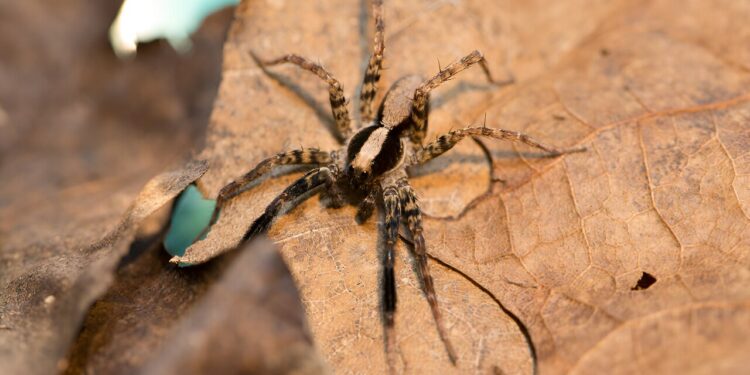Biologists at the University of Cincinnati have discovered that wolf spiders cannot detect predators or communicate with potential mates as easily after rain. They must rely more on visual communication than chemical or vibrational signals. Credit: Joseph Fuqua II
If you hate rain, you have something in common with wolf spiders.
Researchers at the University of Cincinnati have found that wolf spiders cannot signal others or perceive danger from predators as easily on rain-soaked leaves as on dry leaves. Even communicating with potential partners is more difficult after rain.
The study was published in the Journal of Insect Behavior.
Biologists at the University of California’s College of Arts and Sciences studied Schizocosa ocreata, a wolf spider found across much of the United States. Males respond to chemical signals from females using a combination of visual and vibrational signals for courtship.
Spiders do not have ears, but perceive sound in vibrations using specialized sensory organs located in their eight legs. Sound vibrations are transmitted much better in dry leaves.
Wolf spiders are particularly sensitive to the cries of predatory birds like blue jays that feed on spiders, especially during the nesting season when their offspring eat virtually nothing else, said lead author and Professor George Uetz of UC.
“Birds preferentially feed their young spiders, because spiders contain 50 times more taurine than insects,” Uetz said. “And taurine is essential for the development of the hippocampus of the baby bird brain. The hippocampus is associated with spatial memory, which is very important for birds.”
Wolf spiders perceive sound by detecting vibrations in their legs. They often freeze to the discordant calls of blue jays and other birds. Credit: Joseph Fuqua II
Spring nesting season coincides with spider mating season. Male wolf spiders are particularly vulnerable to birds when they attempt to woo a mate with a flashy display, which involves drumming their exaggeratedly hairy front legs on the leaves in front of them.
The UC study found that male spiders become immobile and “freeze” when a blue jay calls nearby. And they stay frozen longer on dry leaves than on wet leaves, perhaps because dry leaves provide better early warning than damp leaves which dampen vibrations.
Uetz said black and brown striped spiders have remarkable camouflage when they remain still.
“If they stay still, they just disappear,” he said.
At the same time, he added: “Like many predators, blue jays are visually oriented. They are very visual. For them, movement is really the key.”
With climate change increasing the frequency and duration of spring rains, wolf spiders will face increasing ecological challenges, Uetz said.
Biologists at the University of Cincinnati have discovered that wolf spiders have a harder time detecting predators and communicating with each other on rain-wet leaves. Credit: Joseph Fuqua II
“Spring is coming a little bit earlier. What we’re seeing is a change in the life cycle of spiders,” Uetz said. “If global warming changes the annual life cycle of spiders, it will put them out of sync with bird nesting season, which is more closely linked to daylight signals.”
Wet leaves did not discourage male spiders from courting females. Male spiders increased visual signaling to compensate for the inability to use vibrations. But spiders that could use dry leaves to communicate with females had more mating success.
UC graduate Rachel Gilbert, co-author of the study, explained that spiders can be important indicators of environmental change.
“Spiders are very important to local ecosystems, both as predators of insects and as a major food source for larger animals like birds,” she said.
More information:
George W. Uetz et al, Effects of leaf moisture on transmission and detection of communication by a wolf spider, Journal of Insect Behavior (2023). DOI: 10.1007/s10905-023-09843-6
Provided by the University of Cincinnati
Quote: Diminished desire: Wolf spiders change their mating strategy after rain (January 17, 2024) retrieved January 17, 2024 from
This document is subject to copyright. Except for fair use for private study or research purposes, no part may be reproduced without written permission. The content is provided for information only.



